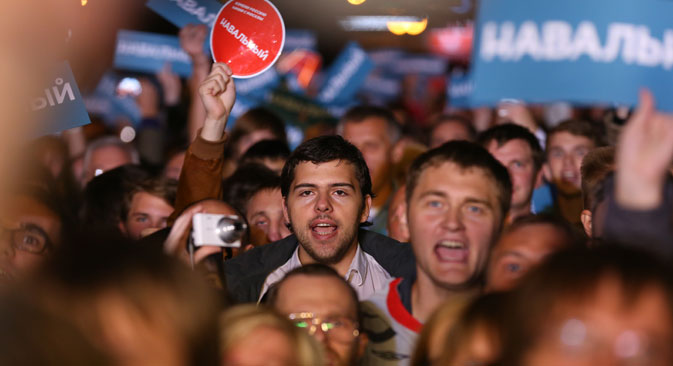
Navalny supporters rally in Moscow, on September 9. Source: ITAR-TASS
Dmitry Bykov, the charismatic Russian TV host-turned-opposition leader, stepped to the podium in downtown Moscow and surveyed the crowd. The sight before him was a historical rarity: thousands of Russians gathered in the freezing rain to protest allegations of rigged parliamentary elections.
“A real civil society has been formed in Russia, and it won't disappear,” Bykov told the cheering throng, who’s very appearance confounded political commentators’ longstanding assumptions about the apathy of Russian voters. “Never before in Moscow was there such a feeling of unity and determination.”
Nearly two years after that chilly afternoon, Bykov and his allies believe the momentum is still in their favor. Although President Vladimir Putin continues to enjoy widespread approval in opinion polls, analysts say opposition figures are capitalizing on the rising prominence of one issue in particular: frustration with corruption.
Pro-business and anti-corruption platforms helped propel opposition figures to previously unimaginable recognition and importance in regional elections this month, including a significant showing in a mayoral vote in the capital.
“Russia's economic growth and societal development over the last decade has reduced tolerance for corruption,” said Dmitry Butrin, Business editor at leading daily Kommersant.
The electoral results will put pressure on the Kremlin to keep Russia’s economy healthy, said Chris Weafer, Senior Partner at Macro Advisory, a Moscow-based research consultancy.
“The protests of late 2011 and early 2012 are finally starting to deliver a positive legacy,” Weafer said. “Investors, far from fearing the political trends may lead to instability, should be much more encouraged that this process of change may soon start to add a greater focus on promised, still slow-moving, reforms.”
In Moscow, anti-corruption activist lawyer Alexei Navalny initially gained prominence after alleging that billions of dollars had been stolen at major state-owned corporations. This month, he emerged as the de-facto leader of Russia's fragmented opposition after garnering an impressive 27 percent of the capital's vote, taking second place.
Vladimir Putin sends signal to corrupt officials
Navalny has filed suit, claiming electoral fraud. But many Kremlin critics said the elections appeared to have been more open than expected, and that earning more than a quarter of the vote in the country’s most important region was a symbolic victory.
“I was impressed. Fair elections have returned to Moscow,” wrote Yulia Latynina, prominent Kremlin critic and talk show host, in Moscow’s English-language daily newspaper, The Moscow Times.
In Yekaterinburg, Russia's fourth-largest city, prominent anti-drugs campaigner and politician from billionaire Mikhail Prokhorov's Civic Platform party Yevgeny Roizman upset the pro-government candidate to win the mayoral election.
An opposition candidate also won the mayor’s seat in Petrozavodsk, capital of Russia's Karelia region.
The Russian Republican Party, which has been struggling for nearly a decade to earn support for its pro-business platform, took seats in the Yaroslavl legislature.
In Moscow, Navalny had led a US-like grass roots campaign, delivering over 100 speeches in the month before the vote across Moscow's districts. His slogan read: “We'll change Russia. We'll start with Moscow.”
To be sure, street protests haven’t overturned the national leadership, as they have in neighboring Ukraine and in the Middle East. The Levada Center, Russia’s respected independent polling agency, put Putin’s approval rating at 65 percent in July.
Leonid Polyakov, Head of the General Political Science Department at the Higher School of Economics, says the public’s rising frustration with corruption in Russia could have long-term economic benefits.
“Fighting corruption was a priority for many politicians who attracted support from voters, so pressure on corrupt officials is likely to increase,” Polyakov said. “The fact that the elections were conducted fairly and openly also raises the legitimacy of entire political system. Nothing will be turned upside-down overnight. But both of these factors will have a positive effect and provide new opportunities to business.”
Butrin of Kommersant agreed, noting change takes time.
“In the long term it can lead to positive results,” Butrin said, “like Italy's campaign in the 1980s that brought tangible improvements to the business climate by the 1990s.”
All rights reserved by Rossiyskaya Gazeta.
Subscribe
to our newsletter!
Get the week's best stories straight to your inbox